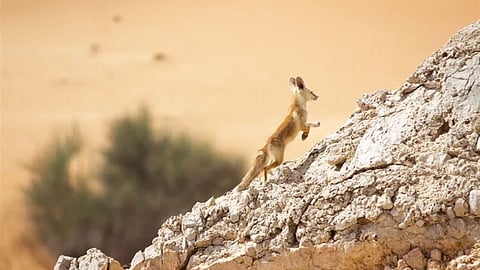Emirates Group Supports Conservation of Fragile Ecosystems
Taking its environmental responsibilities seriously and championing wildlife conservation across different corners of the planet, the Emirates Group is playing its part to support and preserve biodiversity.
The Dubai Desert Conservation Reserve and Emirates One&Only Wolgan Valley in Australia both illustrate the Group’s long-standing focus on protecting fragile ecosystems and support for sustainable tourism in very different parts of the world.
Both conservation reserves protect valuable ecosystems and at the same time provide unique and sustainable experiences for visitors from around the world.
The Emirates Group funds the operations of the 225 square kilometre Dubai Desert Conservation Reserve (DDCR), an inland desert habitat that has been protected by government mandate since 2003.
This is the largest piece of land that Dubai has dedicated to a single project and aims to preserve Dubai’s unique desert environment for future generations.
The reserve is also a focal point for conservation programmes aimed at restoring populations of some of the UAE’s wildlife, such as the Arabian gazelle, sand gazelle and Arabian oryx.
Emirates, SpiceJet Sign Codeshare Deal
In 2018, the DDCR was visited by more than 285,000 tourists, through Arabian Adventures, various Emirates partner tour operators, and the Al Maha Desert Resort.
Emirates has also been supporting the protection of Australia’s extraordinary wildlife and plant life for over 10 years, through the conservation-based Emirates One&Only Wolgan Valley in New South Wales.
Since 2015, Emirates has continued its strong support for actions to stem the illegal trade in wildlife and wildlife products, which is having devastating consequences for endangered animals and the environment in many parts of the world.
In 2018, the Emirates Group also signed the Buenos Aires Declaration on Travel and Tourism and Illegal Wildlife Trade.
The Emirates Group has adopted a zero-tolerance policy to wildlife trafficking and has set up training for its employees for the same.
dnata recently signed an MOU with the University of Pretoria in South Africa to support their research and rehabilitation projects. Under dnata4good, the partnership aims to safeguard wildlife and the environment.
Emirates Group employees living in Meydan Heights (UAE) will be taking part in a Ghaf Tree planting event on 27 April in partnership with Goumbook. The event aims to raise awareness about the importance of conserving the living desert, with a specific focus on the Ghaf tree.


